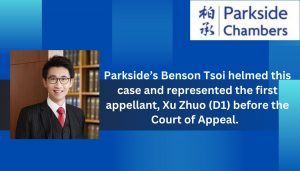Benson Tsoi, instructed by Haldanes, helmed this case and represented the successful first appellant Xu Zhuo (“D1”) in the Court of Appeal, leading to her conviction being quashed without retrial, with costs awarded.
Background
D1 and the second appellant (“D2”) were convicted of Charge 1, which alleged that D1 and D2 conspired for D2, as an employee of L’Voyage Limited (“LV”), to accept secret commissions from D1 as a reward or inducement to place jet flight orders with D1’s company contrary to section 9(1)(a) POBO.
D1 and D2’s case was that D2’s principal, who owned and controlled LV, gave D2 permission to accept the commissions for jet charters placed with D1’s company. It was the defence case that the charters provided did not have the requisite license for commercial flights and were thus “illegal”. D2’s principal gave him permission to take commission from D1 directly by way of “mark ups”.
Both D1 and D2 gave evidence but were convicted. Both appealed against conviction.
In quashing the convictions, the Court of Appeal gave important guidance to a novel point of law, holding that “illegality” of the underlying transaction would not invalidate the permission defence under section 9(4)-(5) POBO.
Illegality of underlying transaction does not invalidate section 9(4)-(5) POBO defence
Section 9(4)-(5) POBO provides that obtaining timely permission from the principal is a defence to a section 9(1) offence. On the facts, the Court of Appeal had to consider the novel question of whether the illegality of the underlying transaction would invalidate the permission defence.
Hon Zervos JA conducted a comprehensive analysis of section 9 POBO, including the legislative intention and elements of the offences (§§46-47), the operation of other available defences (§§48-56), and the operation of the permission defence (§§57-58). The Court then concluded that “section 9 targets transactions tending to undermine the integrity of the agency relationship and is not concerned with regulating the underlying act… The defences under section 9 of “lawful authority”, “reasonable excuse” and “permission” are directed to the offering and accepting of an advantage, not the legality or otherwise of “the act in relation to the principal’s affairs or business.”” (§59).
As a result, if D2’s principal permitted D2 taking such commissions, D1 and D2 would not be guilty of the conspiracy to accept bribes (§62).
Basis of allowing the appeal
The Court of Appeal held that, as the defence case was premised on D2’s principal having given permission for D2 to accept the additional commission from D1, in order to prove that no such permission was given, it was crucial for that principal to be called to give evidence to that effect. Other senior members of D2’s employer company (such as PW1 in the case) were not in a position to give such evidence which would have been hearsay.
Thus, the convictions against D1 and D2 were quashed, and no retrial was ordered. D1 was also awarded costs.

